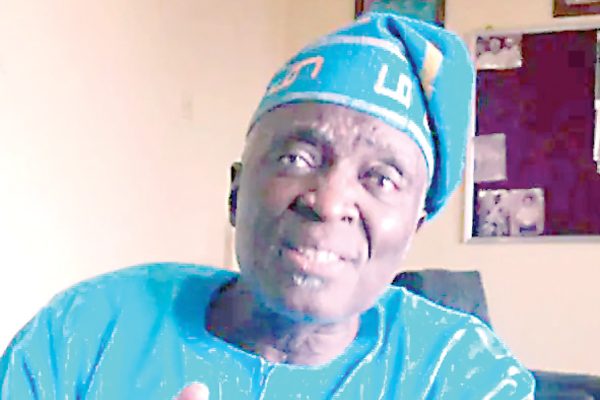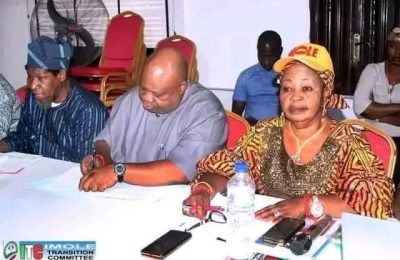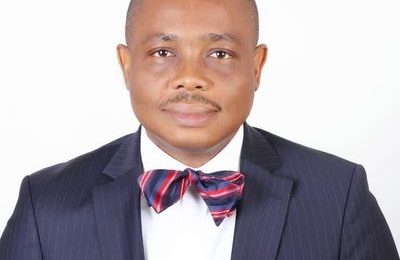

The immediate past Secretary General of the Yoruba Council of Elders, Dr Kunle Olajide, was a medical student at the University of Ibadan during the Western Region in the early 1960s. In this interview by KUNLE ODEREMI, He talks on the effect of the policies of the administration of President Bola Tinubu, ethnic agitation in the country, constitution amendment, money politics and resource control. The excerpts:
IT is a year after the general election. The country is still grappling with some issues that date back to the military government. What is your view on the state of affairs in the country under the first year in office of President Bola Tinubu?

A year after the election, you cannot expect too much, especially because it was the exit of those civilian military to a civilian regime. I refer to the last civilian government as civilian military, Right now, Nigerians would agree that globally, there is economic depression, However, in any case, there a few things Nigeria has not done right, I mean, when the opportunity presented itself. So, the new government in the country had to settle down and study the situation very well to be able to put the right foot forward. In my personal opinion, I think that’s what they are trying to do. However, the combination of coming in freshly within a year and in the midst economic crisis and so on, it has been very difficult for the leadership and painful for the citizens as well. But I sincerely hope that in a couple of weeks or some months, Nigerians should begin to smile hopefully. That’s my prayer.
Some critics say that situation in the country ought not be the way it is since the baton of leadership changed hands was within the ruling All Progressives Congress (APC); that it should not have been that difficult for the new administration to find its rhythm after the seamless political transition?
That is a personal opinion. I don’t think there is any striking difference, especially between the two leading political parties as far as I’m concerned. The answer is in the question you have just given me. Definitely, there is no sharp ideological difference. it is only the Labour Party that anybody would say it is ideologically different but you and I know the level of poverty in the country, the population, then, the extensive area of the country from the Atlantic Ocean to the Sahara Desert, any political party that would election must have quite a huge sum of money. There is no doubt about that because you will need to go in aircraft all over the country and so on, you either charter the aircraft or own one self and entertaining people, given them money to move around, providing other logistics for so many things, and so on. So, that is the problem why the Labour Party, no matter the intension, no matter the character of the personalities, they are still finding it difficult. But I sincerely hope that with time, Nigerians will begin to have a proper assessment of the political parties and cast their votes in the interest of the country correctly.
In other words, what transpired in the 2023 general election was that Nigerians cast their votes in the interest of the country?
In the last election, you and I would agree that money played a very prominent role and anybody would accept that money would play a role because the country is very vast. When you are going to have coordinators, campaign managers in all the 36 states, agents in all the 774 local government t areas, and in the wards, it is a lot of money. It is not a child’s play. But with time, in another one year, we would begin to see movements right and left, from one party to the other, or a new party or something, I’m sure we will make it at the end of the day. But it is a little bit painful now.
There are those who believe that certain policies of the government were hastily introduced; they cite the abrupt removal of subsidy in petrol, with the attendant negative impact on lives of the citizns. Do you have a contrary view to the opinion of such critics?
I want to agree that the action was too hasty. I would have expected it to be gradual; I mean since it was from a hundred and something to about N500 or N600 per litre. It is killing really. But again, when you come to look at the other way, if it were gradual, there would have been a lot of protests and so on and criticisms here and there. But I honestly would have preferred a step-by-step removal of the subsidy on petrol. The situation is really very unbearable. It is very critical. But I think they are taking realistic step to provide succor, but you know Nigeria! The authorities are trying to see what they can do, in fact, making efforts to ensure that the situation becomes less problematic for the citizens and I sincerely hope that in the course of time, the situation will ease up by the grace of God.
Are there specific areas you would want government to address towards dousing the pervasive tension in the land? Do you see any missing link so far?
I would not say missing link as such. The minimum wage issue that they are trying to address, at least, the information that we have so far gives some hope. It is slightly encouraging. That is very important. But when you come to realize what is the percentage of the people in paid government employment in Nigeria? It is very low. I’m sure it must be below 15 percent. It cannot be more than that percentage. Yet, when the price of goods goes up, it affects the entire citizenry. Even those who don’t have access to the minimum wage would be made to pay inflated prices of commodities, food and so on. The government should improve public transportation. Make transportation cheaper and affordable to the ordinary citizen. It is critical and essential. Then, there is the question about power supply. I know the sector has been privatised. Everybody needs power. So, these are the areas that I believe that the government needs to look at so that life would be more comfortable for the people. It is difficult now but I’m sure in a couple of months, we would begin to see the better side of these hard decisions.
With the prices of staple food items already hitting the roof, there is widespread poverty, hunger and anger, with some observers expressing fear of a possible implosion? How should the problem be tackled without further delay?
That’s true, it a serious problem. Again, the way forward is by the government encouraging farmers; making loans accessible to farmers and encouraging other honest individuals willing to go into farming to take loans at a very low rate. The government must monitor the farmers to ensure that they are genuine (farmers), and not business men and others who just want to take advantage of the loan. Access to the farm is also very important because most of the time, the items produced on the farmland are wasted, due to lack of access to the cities. I hope we will get over the challenges because the present government appears very responsive to people’s yearnings and opinion.
But the problem of security persists and many farmers can no longer access their farms in some parts of the country?
On the security situation, I’m happy now from what we are hearing that close to 30 states have endorsed the creation of state police. The existing policing system is not working and cannot work because before a commissioner of Police takes a decision in his domain, he has to get in touch with the Inspector General of Police. So, the creation of state police is highly desirable if we must address the security situation. It will create employment; to some extent, it will reduce unemployment level, and so on. Then, in the catchment area, they would understand their areas of operations better than somebody you post suddenly to an environment he is not familiar with, where he is almost a stranger. But if you have state police trained in a particular environment, he is the citizen of the state; he knows the nooks and crannies of the state, he will better and effective in ensuring that crime rate is reduced. So, it is a good idea that it getting accepted by majority of the stakeholders.
What about the apprehension that state police could be susceptible to abuse governors, given their enormous power under the Nigerian Constitution? How should the fear be addressed?
Some people accuse the federal government too of using the Nigeria Police. It will be difficult. Yes, some state governors might attempt it but I can tell you with the communication in the country today, some state governors who might try to do that will be terribly embarrassed and they are bound to lose favour even within their states. It can’t be what it was years ago. I’m sure some of you were very young when we had state regional police. They will use Indian hemp in your compound and turn around to arrest you that you are theone growing the illicit weed. We have gone beyond that now. So, state police, now, is desirable and it will be a welcome development.
What are the other fundamental issues you think should be touched in the fresh efforts to amend the 1999 Constitution by the National Assembly?
The revenue allocation formula should be reviewed in such a way that where the revenue is generated should have a larger chunk of it. Governors run to and from Abuja all the time at the call and beck of Mr President; that is not right. We don’t have a unitary regime in Nigeria; we have a federal system of government, which in fact, means that each of the federating units, to a large extent, is independent. Governors run to Abuja, sometimes three times in a week; they charter aircraft. Sometimes, they are summoned to Abuja two or three times a week. No, that trend is wrong and unacceptable. They must be allowed to operate freely.
How about the party system, which has been an object of criticism? Are you satisfied with the status quo or there are areas in the extant law ought to be amended?
We have a multiparty system now. I think there was a condition in the law that parties should have offices in at least two thirds of the 36 states. That is not necessary. You can have a party that decides that it wants to operate just in Ibadan. Such a party should be allowed to exist. It should be registered once the people accept the party. If I want to float a party in Ekiti State and I am not going beyond the stat, I should be able to do that. Once the people accept me. There is so much legislation and rigidity about political party activities and I think that that should be relaxed. You may decide that it is only in Ibadan you want your party or in Osun State and if the people choose and follow you, yes that’s alright. You may not form the government in Osun but you may have your own representative.
There is a persistent clamour that the President of the country should be divested of the power to nominate the chairman of the Independent National Electoral Commission (INEC) chairman if the commission must truly be independent….
I agree. The law can empower the president to nominate three candidates to be considered for the position of the INEC chairman by the Senate. It will pick one of the candidates so that whoever becomes the chairman of the commission will be responsible to the entire country because it is the Senate representing the country now that confirmed one of the nominees for the position. So, whoever is the INEC chairman and his team don’t have to be listening to or dancing to the tune of a sitting president of the country.
Where do you stand on the pattern that the conduct of local government elections have assumed over the years, a situation where a ruling party clears all contestable seats in very curious circumstances? There are suggestions that INEC should take over the conduct of such elections.
Yes, I prefer that the INEC should take over the conduct of local government elections. What we have seen in local government election, most of the time, there are no elections at all. The INEC should takeover such elections.
Will it not negate the spirit and letters of federalism under which both centre and states are of a coordinate status?
You must realize that we are just maturing and it’s like when a baby is learning to walk and ultimately, to run, it takes some time. You don’t just begin to function like the United States of America right away. So, I think INEC should take over the conduct of local government election. We all saw what happened in states where such elections happened. To say the least, they were no lections at all. In fact, because the states are organizing such elections, the citizens of the state do not show much interest. They are very lukewarm; there is voter apathy because the people believe that the organizers will end up writing whatever they like. Voters do not even know the candidates; that shows the degree of apathy. So, let us centralize the conduct of LG polls and as time goes on when the citizens become more mature on the practice of democracy and federalism, then we can begin to disengage. But for now, let INEC conduct local government elections.
Nigeria moved from the Parliamentary system of government to the existing presidential arrangement. Already, some prominent individuals such as former President Olusegun Obasanjo claim the western democracy has failed us, so we should evolve a homegrown alternative or model that will be based on our complexities and experience as a people.
It looks so simple to say it has failed us, especially when you remember how many years we were under military rule. In fact, when Obasanjo was president, there was still a sort of pseudo military rule, so to speak. I don’t think we should go that route. I see western democracy working effectively in Nigeria but it will take some time. We should appreciate the level of literacy among our people and a lot of people don’t even know the candidates they are voting for; they don’t care because they always believe that their votes don’t count. So, we need to progressively move to reassure the people that their vote would count and that nobody would undermine their right to decide who gets their mandate and govern them. We need confidence building and integrity of electoral process. People need to have confidence in the ballot box. If, to a large extent, the elections are fair, the people will become more active and confident in the process that throws up leadership at all the levels of government.
Vote buying and selling have unwittingly become an ugly part of our political process, with almost all key gladiators guilty of inducement of voters, and others involved in managing our elections. Should we indeed see as part of the way of life in the political space, in spite of the grave implications of money politics on leadership recruitment process?
A lot of people have complained and raised this issue with me. What I told them was that very soon, there will be a counterbalance; that people will collect money and vote for the candidate of their choice; their preferred candidates, especially if we ensure that INEC officials perform their duty as they ought as required by law. But for the voters, they will collect your money and other forms of inducements, yet vote against you. I have seen that happen, even recently. So, it is the level of poverty that seems to allow that. I believe with time, and not too long a time indeed, people will realize that their vote is their weapon for development ; their vote is their weapon for them to have good education for their children; that their vote is their weapon to feed themselves, so they won’t sell it for a pittance of N5, 000 or N10, 000. They will relies that their vote is far more expensive than millions of naira that they are selling cheap, the future of their and that of their children, as well as that of the society.
Ethic agitators attribute their passive resistance or otherwise to various acts of injustices under the current federal arrangement. Are those issues being addressed in the present political dispensation in the country?
I must give it to the Tinubu administration. He is trying to address that area. There must be some ethnic balancing. People will want to feel part of the government because when you want good to come to them, and they will have to travel hundreds of kilometers to see the person representing them in the state House of Assembly, so, we will get there and it is becoming obvious that individuals can no longer take our people for granted. You probably observed during the last general election, the elites, in various communities, were very determined, At least in my local government in Ekiti State, the elites mobilised for the election. So, the singular action raises some hope that we will get there as a country; we should not despond.
ALSO READ: Condemnations trail reinstatement of Sanusi as Emir despite court order








